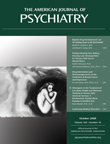Olanzapine in the Treatment of Low Body Weight and Obsessive Thinking in Women With Anorexia Nervosa: A Randomized, Double-Blind, Placebo-Controlled Trial
Abstract
Objective: Anorexia nervosa is associated with high mortality, morbidity, and treatment costs. Olanzapine, an atypical antipsychotic, is known to result in weight gain in other patient populations. The objective of this trial was to assess the efficacy of olanzapine in promoting weight gain and in reducing obsessive symptoms among adult women with anorexia nervosa. Method: The study was a double-blind, placebo-controlled, 10-week flexible dose trial in which patients with anorexia nervosa (N=34) were randomly assigned to either olanzapine plus day hospital treatment or placebo plus day hospital treatment. Results: Compared with placebo, olanzapine resulted in a greater rate of increase in weight, earlier achievement of target body mass index, and a greater rate of decrease in obsessive symptoms. No differences in adverse effects were observed between the two treatment conditions. Conclusions: These preliminary results suggest that olanzapine may be safely used in achieving more rapid weight gain and improvement in obsessive symptoms among women with anorexia nervosa. Replication, in the form of a large multicenter trial, is recommended.



